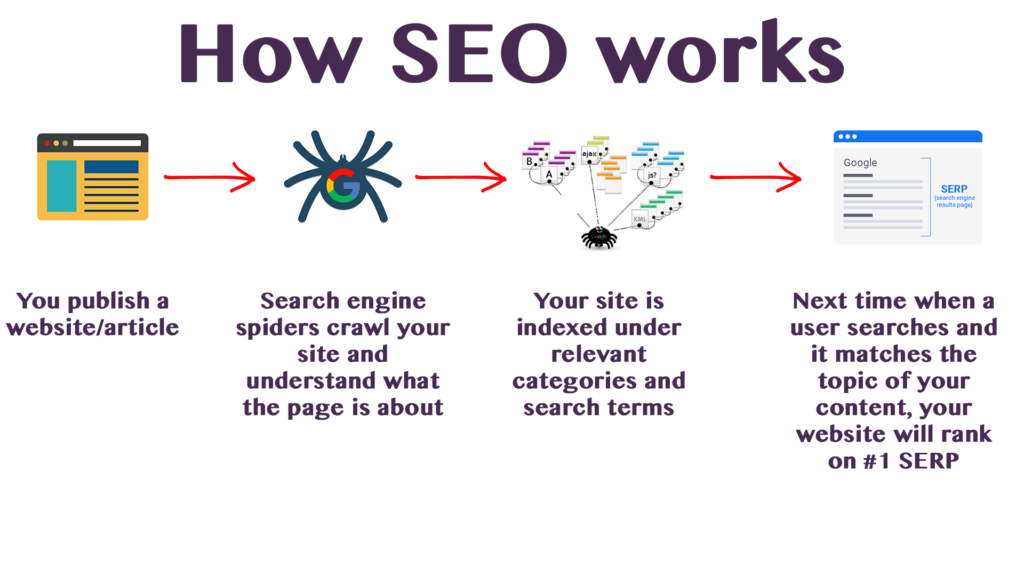

Search Engine Optimization (SEO) is the practice of optimizing websites and their content to rank higher in search engine results pages (SERPs). SEO is a complex and ever-changing field, but understanding how it works can help you improve your website's visibility and attract more organic traffic.
There are several components of SEO, including on-page optimization, off-page optimization, and technical optimization. Let's take a closer look at each of these areas.

On-page optimization
On-page optimization refers to the strategies used to optimize individual pages on your website for search engines. This includes optimizing content, meta tags, and HTML elements. Some key elements of on-page optimization include:
Keyword research: Conducting research to identify the most relevant and profitable keywords for your business and optimizing your content around those keywords.
Content optimization: Creating high-quality, engaging, and informative content that satisfies the search intent of your target audience.
Meta tags: Writing title tags, meta descriptions, and header tags that are descriptive, concise, and include your target keywords.
Image optimization: Optimizing image alt tags and file names to make sure they are search engine friendly.
Internal linking: Creating internal links between pages on your website to help search engines understand the structure of your site.
Off-page optimization
Off-page optimization refers to the strategies used to optimize your website's external factors. This includes link building, social media, and other external factors that can impact your website's search engine ranking. Some key elements of off-page optimization include:

Link building: Building high-quality backlinks from other websites to improve your website's authority and trustworthiness in the eyes of search engines.
Social media marketing: Promoting your content on social media platforms to attract more visitors and increase engagement.
Guest blogging: Writing guest blog posts for other websites to build relationships and gain exposure.
Online directory listings: Listing your business in online directories to increase visibility and improve local search rankings.
Technical optimization
Technical optimization refers to the strategies used to optimize your website's technical elements. This includes optimizing your website's code, structure, and performance. Some key elements of technical optimization include:

Site speed: Optimizing your website's loading speed to improve user experience and reduce bounce rates.
Mobile responsiveness: Ensuring that your website is mobile-friendly and can be easily accessed on mobile devices.
Site architecture: Creating a clear and easy-to-navigate website structure that helps search engines crawl and index your content.
Schema markup: Using schema markup to provide additional information to search engines and improve the visibility of your content in search results.
HTTPS: Ensuring that your website is secure by using HTTPS instead of HTTP.
The role of search engines in SEO
Search engines play a critical role in SEO. They use complex algorithms to analyze and rank websites based on a variety of factors, including relevance, authority, and user experience. The goal of SEO is to optimize your website to meet the criteria that search engines use to rank websites.
Search engines use a variety of tools and metrics to analyze websites and determine their relevance and authority. Some of these tools include:
Crawlers: Automated tools used by search engines to scan websites and collect data about their content and structure.
Algorithms: Complex sets of rules used by search engines to analyze websites and determine their relevance and authority.
Metrics: Quantitative measures used to evaluate websites, such as domain authority, page authority, and backlink quality.
SEO is an ongoing process
SEO is an ongoing process that requires constant monitoring and optimization. Search engines are constantly updating their algorithms and ranking factors, which means that your website needs to be regularly updated and optimized to maintain its position in search results.
It's also important to remember that SEO is not a one-time process. It requires continuous effort and attention to detail to achieve and maintain high search engine rankings. This means that you should always be looking for ways to improve your website's content, structure, and performance to ensure that it remains competitive in search results.
One important aspect of SEO is analytics. Analytics tools allow you to monitor your website's performance in search results and identify areas where you can improve your optimization efforts. You can use analytics to track your website's traffic, bounce rates, conversion rates, and other important metrics to gain insights into how users are interacting with your website.
Conclusion
In conclusion, SEO is a complex and multifaceted field that requires a deep understanding of search engine algorithms, user behavior, and website optimization strategies. By implementing on-page, off-page, and technical optimization strategies, you can improve your website's visibility in search results and attract more organic traffic. However, SEO is an ongoing process that requires continuous effort and attention to detail to achieve and maintain high search engine rankings. By staying up-to-date on the latest SEO trends and best practices, you can ensure that your website remains competitive and effective in driving organic traffic and achieving your business goals.